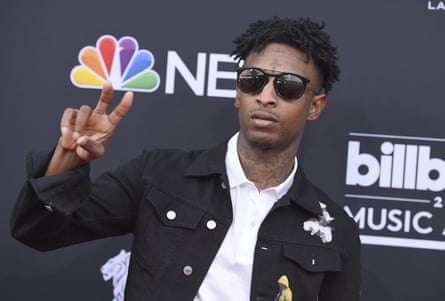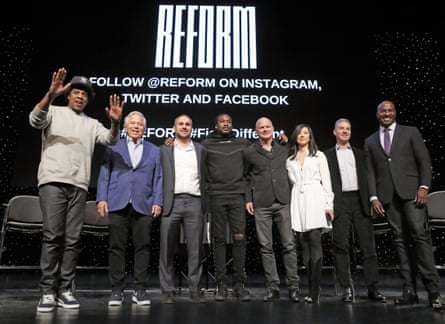On an early Monday morning in February, 11-year-old Jabari Talbot, who is African American, decided not to stand for the pledge of allegiance in his classroom at Lawton Chiles Middle Academy. Another classmate, who is not African American, joined him, a civil rights complaint obtained by the Guardian claims, but the child was not questioned by the substitute teacher.
“Equality in this country is not fair ... black people are not treated fairly,” he answered the teacher when asked why he would not stand, adding, “[and] police don’t treat black people fairly”.
Within minutes, as if to prove his point, Jabari was escorted out of the room and by the time his mother arrived, she was told by the resource officer her son had been arrested. Handcuffed and placed in a cell, he was released hours later after being charged.
Within a month, the sixth-grader has had the help of not only his local legal counsel in Florida, the attorney Roderick Ford, but also the rapper Jay-Z; Team Roc, the philanthropic arm of Jay-Z’s organization Roc Nation; and one of his famed attorneys, Alex Spiro, who has worked on dozens of civil rights and social justice-related cases at the request of the hip-hop mogul.
“I do think there is a common thread to [Jay-Z’s] work and to ensure that all people are treated equally,” said Spiro, the 36-year-old New York-based attorney for a number of celebrities, who, at the request of Team Roc, stepped in to assist the sixth grader. “If we can get involved in a young person’s life early before someone is convicted, before they are sidetracked by the criminal justice system or detained, you have a better chance to affect change or create progress,” Spiro added.
Days after Team Roc collaborated with Ford in Florida, Talbot’s case was dismissed.
“My son and I are grateful for all the athletes, entertainers, Roc Nation and community of supporters that have raised awareness about this injustice and showed their support – both publicly and privately – during our time of need,” Talbot’s mother, Dhakira, said in a statement released to the Guardian. “Although Jabari’s case has been dismissed, I do want people to know this isn’t just about my son – this prejudice happens to African American kids all across the country.”
Many of the cases Jay-Z has been involved with, with the help of Spiro, have mirrored the issues plaguing America in recent years: the debate around the former NFL quarterback Colin Kaepernick refusing to stand for the national anthem – and as a result, no longer playing professionally; the absence of accountability for police actions; and the ever-expanding, albeit inherited, system of immigrant detention under the Trump administration.
“You always want to be on the right side of the issue,” Spiro explained, discussing why he has worked with Jay-Z on many of these cases in recent years. For example, right before Jay-Z rushed in to help Jabari, he was advocating for the release of the Atlanta-based rapper 21 Savage after he was detained by US Immigration and Customs Enforcement (Ice) and threatened with deportation back to the UK on Super Bowl Sunday this year.

“The arrest and detention of 21 Savage is an absolute travesty, his U visa petition has been pending for four years,” a statement from Jay-Z on Team Roc’s twitter account said. Spiro, seemingly Jay-Z’s go-to attorney, was called in to assist 21 Savage’s Atlanta-based attorney Charles Kuck on that case, too. A few days later, the rapper was released from an Ice detention center in Georgia.
Jay-Z hasn’t been shy about voicing his disdain of Donald Trump, calling him “the superbug” in an interview with CNN’s Van Jones. After the rapper spent eight years supporting Barack Obama, his opposition to the current president is unsurprising. Jay-Z has supported a number of Obama’s policies, from gay marriage to criminal justice reform.
But long before Obama’s tenure in the White House, Jay-Z advocated against racism, implicit bias, and inequality for years, though often his philanthropic efforts and activism have taken place under the radar.
In 2003, Jay-Z established a fund to “help individuals facing socioeconomic hardships to further their education at post secondary institutions”, the mission statement of the foundation says. Having grown up in Brooklyn’s Marcy Projects, Jay-Z hasn’t shied away from telling his own stories of hardship. “Sometimes we’d pay the light bill, sometimes we paid the phone, sometimes the gas went off. We weren’t starving – we were eating, we were OK. But it was things like you didn’t want to be embarrassed when you went to school,” he told Vanity Fair in a 2013 interview, explaining his efforts as an adult.
In 2008, the hip-hop mogul created an educational trust for the children of Sean Bell, a black man shot and killed by police on his wedding day in New York. At the height of protests in Baltimore, Maryland, and Ferguson, Missouri – after the deaths of Freddie Gray and Michael Brown – Jay-Z bailed out protesters participating in anti-police brutality demonstrations, the Guardian reported.
Recently, his team helped handle a case in Memphis, Tennessee, after a young black man, Montavious Smith, was arrested for refusing to pull down the hood on his sweatshirt. The retired journalist Kevin McKenzie, who filmed the encounter, was also arrested and charged with a misdemeanor after he drew attention for filming an earlier exchange between police and a pair of young black men.
It was extremely humiliating, McKenzie says, to be forced to go down to the jail, be booked, have fingerprints taken and be treated like a criminal. Initially, he was going to fight the misdemeanor citation himself, but when Roc Nation reached out through social media to his wife, who had posted his video of the encounter, McKenzie accepted the help of the team.

“To have somebody at Roc Nation’s level, with that level of resources and that level of powerful lawyering and that level of focus and celebrity to shine a light on this, that makes me very hopeful that these issues we’ve been struggling with as black people and black men in particular all of our lives are getting some real powerful focus that might be able to help,” McKenzie told the Guardian.
In 2017, in an op-ed for the New York Times, in defense of the rapper Meek Mill, who was arrested for violating his probation after he popped a wheelie on a motorcycle on a music video shoot, Jay-Z made sure his opinion was clear.
“What’s happening to Meek Mill is just one example of how our criminal justice system entraps and harasses hundreds of thousands of black people every day,” he wrote.
According to Meek Mill, who was released five months later in April 2018, Jay-Z quietly paid millions of dollars in legal fees during his incarceration. “I don’t even think I could have afforded it,” Mill admitted in an interview with Essence magazine.
Meek Mill, an 11-year-old in central Florida, and a British-born rapper have much more in common than just the assistance of a superstar and his legal team as they make their way through varying levels of the criminal justice system. Most black men do, McKenzie says, and they are lucky to have the rapper-turned-mogul on their side, he says.
“It’s the kind of strength you could only wish for because, let’s face it, what other rich people in America have put their wealth and power and influence behind the issue of mass incarceration?”
